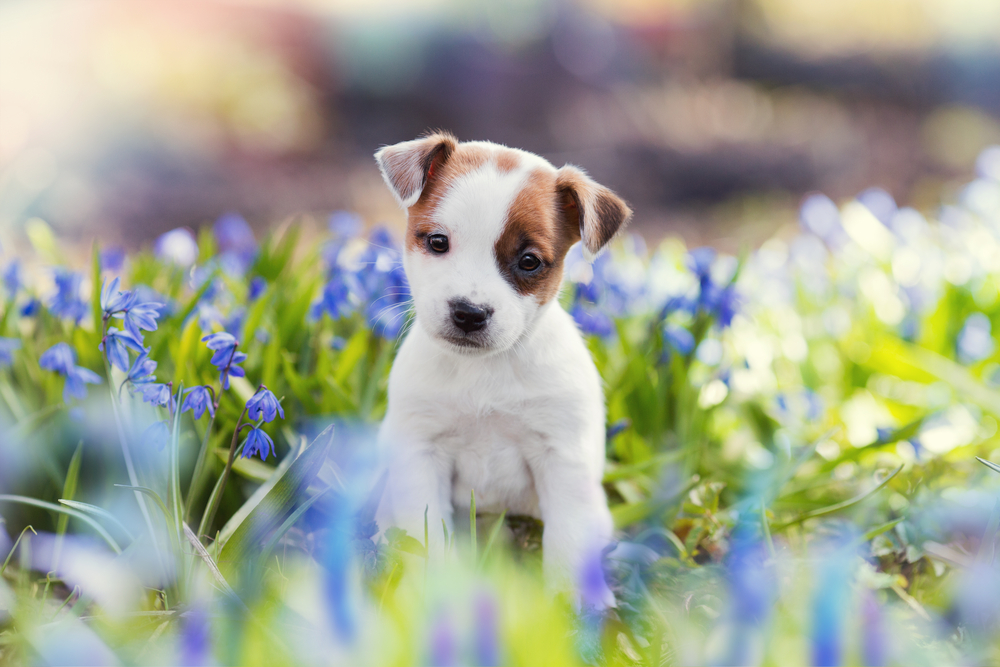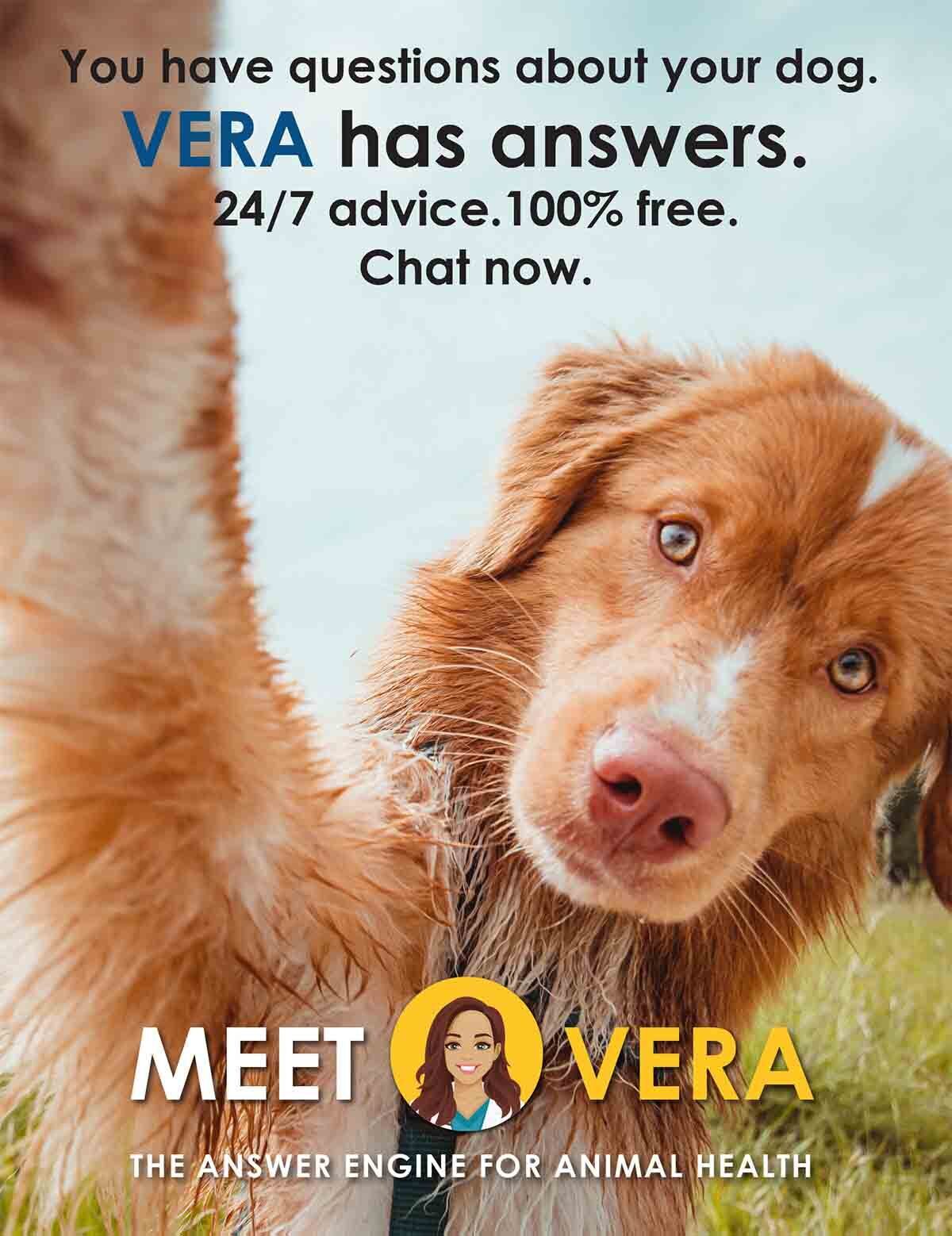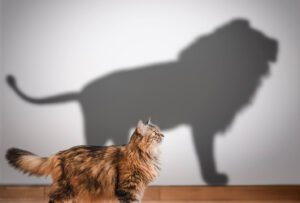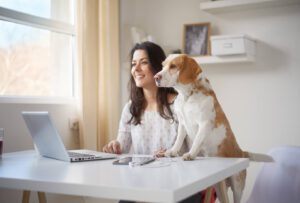Congratulations, you have just brought home your fluffy new family member and everyone is in love! You’ve pulled the tags off your puppy’s new collar, leash and toys, washed his new food bowl, and assembled his crate. Let the fun begin! And then, the pup has an accident on your rug…and then you find another accident on your bedroom carpet…and a puddle is noted on the kitchen floor…AHH! Get that puppy potty trained ASAP!
Our veterinarians usually advise on variations of a similar approach to puppy potty training, all with the same common themes of consistency, patience, and positive reinforcement. Some puppies are geniuses and will learn very quickly in a matter of days, where others take their time to catch on and will often even have periods of regression weeks and months into the process. Not only do puppies need to learn where it is appropriate to relieve themselves, they are also learning where NOT to!
Crate Training
Crate training and house training go hand in hand. Knowing how to crate train a puppy helps to foster independence, creates a safe and cozy spot for your puppy to rest, and also will help them learn to train and control their bladder from a young age! Dogs like to keep their den sleeping area clean and will not soil where they sleep. The puppy’s crate should be just big enough for him to lay down, stand up, and turn around, and any extra space should be blocked with a box so that the puppy cannot go potty and then escape to another area. Follow the crate training steps to get your young puppy adjusted and comfortable in their crate while at the same time expediting the house training process using the following helpful hints.
The Easiest Way to Potty Train a Puppy
Get Ready to Go Outside… a Lot!
The easiest way to help your puppy catch on to your desired potty-training program is to not allow them the opportunity to potty in the house! From the moment that you bring your 8-week-old puppy into your home, get ready to take them outside frequently. Puppies are like infants, and they require a lot of energy from their parents when they are very young. This is all normal, though, and once you have put in the time to establish good habits and expectations, it gets much easier! Keep up the routine and consistent positive message, and your puppy will be faster and more accurate in due time!
When your new puppy first wakes up in the morning, or when you first arrive home from being out, take them out of the crate and immediately go outside to the potty spot (carry them or rush them quickly on a leash). Say a phrase like “go potty” and stand quietly waiting for your puppy to do their business. It is critical to stay still and quiet while the puppy is sniffing around so that you don’t distract them from using the bathroom — their attention spans are very short!
When they do go potty, praise them extensively and give them a treat; positive reinforcement goes a long way! Puppies need to have the treat within two seconds of exhibiting the desired behavior for their brain to associate the action and the reward. Training treats that you keep in your pocket are an essential tool for potty training.
Once your puppy has performed #1 and #2, it is time to return inside. If they do not accomplish both tasks, you have the option of returning your puppy to their crate for another 15 minutes and then repeating the process, or you can keep your puppy closely tethered to you on a leash inside so you can watch for signs that they need to go (sniffing the ground, whining, circling, looking towards the door or outside) and then plan on returning outside every 15-30 minutes until the full mission is accomplished.
Once your puppy has used the bathroom outside, try to frequent the potty spot again and again, approximately every hour when you are just starting out! Puppies have tiny bladders and will often pee when they first feel the urge, so taking them outdoors often enough to prevent random squatting in the house will keep the concept clear.
Keep On Schedule
Keep in mind that puppies generally need to potty within 30 minutes to an hour after eating. So, in addition to navigating what to feed a puppy, it’s also important to create a potty schedule around their diet. Plan on feeding your pup their three meals a day and spending some time outdoors during that hour after eating until you witness their potty accomplishments. Timing these trips will give more opportunity for success and help your puppy to master the concepts more quickly! Prior to bedtime, take your puppy out for a final potty break just before putting them in their crate and turning in for the night.
Training Setbacks and Accidents
What to do when you catch your puppy in the act of squatting in the house? Pick them up immediately and go outside to the potty spot (or gently nudge them towards the outdoors if they are too large to carry). Hopefully, they will stop mid-process and ideally continue the job outdoors. Punishing an accident indoors only creates fear, and we do not recommend any repercussions for these slip-ups. Praise when finishing the deed outside is always encouraged! Although accidents in the house are frustrating, it’s important to remember that rewarding the behavior you want and ignoring the behavior you don’t want is much more effective than any punishment — and it creates a stronger bond between you and your puppy.
And when you find the puddle or pile on your rug or hardwood floor and the pup is long gone? Just grab your enzymatic cleaner (one of the essential things you need for a puppy) and clean up that mess! Your puppy has already forgotten about that mistake, so once you’ve tossed the evidence, you should too! Showing them their mistake or telling them about it does nothing but potentially cause fear. Just clean up the mess, and move right along, making plans for your next outdoor potty outing with your puppy!
Some General Tips and Tricks
As a rule of thumb, puppies can be crated and hold their bladders for the same number of hours as they are in months. For example, an 8-week-old puppy can be crated for up to 2 hours a day and through the night if they are sleeping. Also, be sure they did not drink a large amount of water and that they had a potty break prior to crating. When you are in the earlier stages of crate and puppy potty training, it is wise to place the crate overnight in the bedroom, so you can hear any whining that might indicate the youngster needs to take a potty break outdoors. We do need to be careful that we are not praising whining by allowing them out of their crate for fun playtime. Whining at night should be greeted by a quick trip outdoors, minimal excitement and fun (unless they potty, then they can be praised), and then straight back into the crate with a treat to continue bedtime.
Again, some puppies will take an extended period of time (months even) to become fully house-trained but keep at it! If your puppy seems to relapse a bit, backtrack in your training and continue the frequent trips outdoors every 1-2 hours until you have reminded them of the program. New surroundings and changes in the home may be greeted by some potty regression, too … just back up a little and get them back on track!
Sadly, many dogs are relinquished to shelters for potty-related behavior issues, likely due to incomplete training when they were young, and it can cost them their family. If your puppy seems to be having what seems like an abnormal experience, your AskVet veterinarians are ready to assess your situation, provide some troubleshooting tips and assess the need to take the next steps to have your family veterinarian test for a urinary tract infection, bladder or kidney problem.
Puppy Training Pads and Real/Artificial Grass Substrates
Where it is traditional for dogs to use the outdoors and nature as their restroom, the modern city dog, some tiny toy breeds or during times of adverse weather conditions and global pandemics, some pet parents turn to an indoor potty pad or real/artificial grass substrates for their puppies. The same principles apply as above, just take your puppy to the desired potty option and be consistent and positive! Changing from indoors to outdoors can cause some confusion, but with repetition, patience and persistence, it can be accomplished.
Yay, My Puppy is Potty Trained!
Congratulations on being a puppy owner that put the time and patience into teaching your young puppy the appropriate place to relieve themselves. That is no easy task! As puppies learn and mature, your trips outdoors can become less frequent and more focused on enjoying the outside world. Continue providing them their daily walks and outdoor exercise since it is vital to their mental, physical and emotional health and more fun for you both! And always remember that your AskVet Care Squad is available to answer questions and help you make the most of your time together!
Our AskVet Veterinarians are available to discuss all of your pet’s needs 24 hours a day, 7 days a week. Whether you have an immediate need or are looking to improve your pet’s overall wellbeing, just sign in to your account, and one of our friendly and knowledgeable veterinary experts will attend to your needs, no appointment required!
Written by:
Alexa Waltz, DVM
Dr. Waltz was raised near the beaches of Southern California but has spent her adult life living all over the beautiful United States while serving in the military and as a military spouse. She left California for the first time to pursue a career as a veterinarian at Louisiana State University School of Veterinary Medicine and graduated as a Doctor of Veterinary Medicine in 2006. She was accepted into the US Army Health Professionals Scholarship Program during vet school and upon graduation spent her military years as a veterinarian in San Diego working for the US Marine Corps and US Navy Military Working Dog programs as well as caring for pets of service members. After her military service, she became a civilian veterinarian and continued as a small animal general practitioner at clinics in California, Rhode Island, Colorado, and Maryland. Dr Waltz loves to see her “in person” patients just as much as communicating with and assisting pet parents virtually on AskVet. Dr Waltz is also a Mom to 3 humans, 2 guinea pigs, and 1 Australian Shepherd and in her spare time she loves traveling, adventures, exercising, and doing just about anything out in nature!






